#IEC Code
Explore tagged Tumblr posts
Text
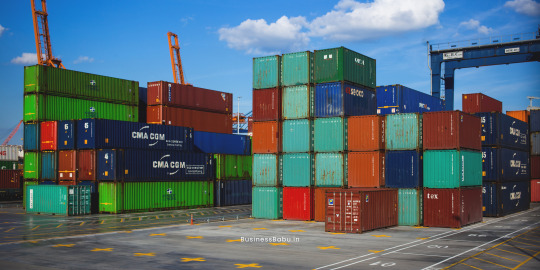
Get your IEC Certificate in just 1 hour.
IEC Registration is mandatory to start export import business In India.
Connect with Business Babu today to start your exim venture.
Contact BusinessBabu.in on [email protected]
#startup#business#exporter#export#import#exim#iec registration#import exprot code#iec certificate#iec code
0 notes
Text
Can I Use One IEC for Multiple Businesses?
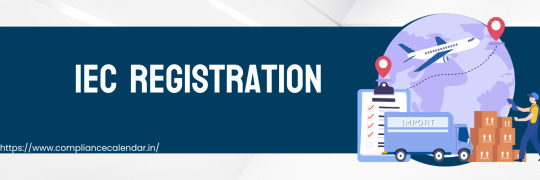
More business owners and entrepreneurs are looking into import-export prospects as a result of India's increasing international trade. Getting the IEC Code, which stands for Import Export Code, is one of the first compliance procedures in this process. As startups develop, some entrepreneurs manage several firms and frequently inquire, "Can I use one IEC for multiple businesses?" In a nutshell, it relies on the structure of your companies. In addition to discussing compliance, updates, and situations when a second IEC may be required, this extensive book will explain the notion of IEC Code Registration, examine legal restrictions, and make clear how many enterprises you can operate under a single IEC Registration.
What is IEC Code and Why Is It Needed?
The Import Export Code (IEC) is a 10-digit unique id number issued by the Directorate General of Foreign Trade (DGFT) under the Ministry of Commerce & Industry, Government of India. It is mandatory for any individual or business entity involved in importing or exporting goods and services.
Importance of IEC Code:
Required for customs clearance at ports and airports.
Mandatory for processing foreign currency transactions via banks.
Enables access to export-related government schemes like RoDTEP and SEIS.
Legally recognizes your business in international trade.
Without proper IEC Code Registration, your international trade operations cannot legally proceed.
Knowing the Ownership Structure and IEC Allocation
The IEC Registration is PAN-based, meaning that it is issued per legal entity, not per business activity. Therefore, whether you can use one IEC for multiple businesses entirely depends on how those businesses are legally structured.
Scenario 1: Multiple Businesses Under One Legal Entity (Same PAN)
If you operate multiple business verticals or brands under the same legal entity and PAN, such as:
A sole proprietorship with multiple trade names
A private limited company with diverse product lines
An LLP running different services under the same roof
Then yes, one IEC is sufficient. Your IEC Code is tied to the PAN of your legal entity, and the nature of business or product types is not limited under the code.
Example: ABC Traders (proprietorship) sells textiles, handicrafts, and organic food under different brand names. Since all these operations fall under the same PAN, one IEC Code works for all.
Scenario 2: Multiple Legal Entities (Different PANs)
If you own different companies or firms that have separate PANs, each of them must apply for IEC Code Registration individually.
Why? Because IEC is issued based on the PAN of the entity. Each legal entity is considered a separate person under Indian law.
Example: Mr. Sharma owns two companies:
Sharma Exports Pvt Ltd
GreenTech Agro LLP
Each company has a distinct PAN. Therefore, both must apply for separate IEC Codes through individual Import Export Code Registration processes.
Scenario 3: Different Branches or Locations Under One Entity
If your company operates from multiple branches or cities, you do not need multiple IECs. The same IEC can be used across India. However, you may update branch details in your IEC Registration profile on the DGFT portal.
Tip: Use the IEC Update feature to add or modify branch addresses and bank details for smooth customs and banking operations.
Key Considerations Before Using One IEC for Multiple Businesses
While the law permits using one Import Export Code for all businesses under the same PAN, there are a few practical considerations:
1. Maintain Clear Records
Even if you use a single IEC across product categories or brands, you must maintain separate records for each vertical. This helps during audits, GST filings, and customs investigations.
2. Use Trade Name Carefully
If you're exporting under a different brand name, confirm the invoices and documents mention your legal entity name (as per PAN) along with the brand name.
3. Update Business Activities on DGFT
The DGFT portal allows you to update or add new business activities. Use the IEC Update feature to reflect changes in product types or services offered.
4. Confirm Bank and GST Linking
Confirm that the bank accounts and GSTINs linked to your IEC are updated. Mismatched details can delay shipping bill clearance or refund claims.
How to Apply for IEC Code Registration?
Here is the simplified process for Import Export Code Registration:
Step 1: Visit DGFT Portal
Go to the website and register using your PAN.
Step 2: Fill Online IEC Application
Provide business details like entity name, PAN, contact info, and bank account.
Step 3: Upload Documents
Required documents include:
PAN card
Address proof
Cancelled cheque or bank certificate
Aadhaar card of applicant
Incorporation documents (for companies/LLPs)
Step 4: Pay Government Fee
The official fee for IEC application is ₹500, payable online.
Step 5: Receive IEC Certificate
Within 24–72 hours, the IEC Code is issued in digital format. It remains valid for life unless surrendered or canceled.
When Should You Consider Separate IEC Registrations?
Even though it’s legally allowed to operate multiple businesses under a single IEC Code, you may still choose to apply separately for strategic reasons.
Situations That Warrant Separate IECs:
Operating joint ventures with distinct partners
Risk mitigation: avoid compliance spillover from one business to another
Different export destinations and trade agreements
Branding or market segmentation strategy
Having separate IEC Registrations for different companies makes financial tracking, tax filing, and compliance easier in such cases.
What Happens If You Use One IEC Incorrectly Across PANs?
Using the same IEC Code for different businesses that have separate PANs is a serious violation of DGFT rules.
Consequences Include:
Cancellation of IEC
Customs penalties
Rejection of shipping bills or refunds
Suspension of foreign currency payments by banks
To remain compliant, confirm that your IEC Code Registration is aligned with the correct PAN and legal entity.
How to Manage Multiple Business Activities Under One IEC?
If you’re managing multiple business lines under the same entity, follow these best practices:
Segment accounting and invoicing for each business category.
Register multiple GSTINs for different branches and map them to the IEC.
Use DGFT’s IEC Update feature to revise business descriptions, addresses, or bank details when needed.
Communicate the correct IEC and PAN to your shipping partners and customs house agents.
Assumption
Your key to international trade is the IEC Code. Knowing how IEC Code Registration relates to your business structure is essential, regardless of whether you're managing several verticals or exporting a single product. A single IEC registration is both acceptable and practicable if all of your business endeavors are under a single legal organization and PAN. Separate import-export code registrations are not only necessary, but legally essential when running different businesses with different PANs. Either way, make sure your trade operations match your registered credentials, adhere to compliance best practices, and constantly keep your IEC up to date. Your IEC Code can support several business concepts and enable you to grow globally without encountering any difficulties if it is set up properly.
FAQs
Can one person apply for multiple IECs?
Ans No. As per DGFT, one PAN can have only one IEC Code Registration.
Can a business have two IECs for different locations?
Ans No. The same IEC can be used across India, regardless of location.
Do I need a new IEC if I change my business structure?
Ans Yes, if your PAN changes (e.g., shifting from proprietorship to Pvt Ltd), you must apply for a new Import Export Code.
0 notes
Text
PROJECT REPORTS
#iec code#income tax#project report#ANNUAL PLAN#TAXATION#economy#business registration#foreign company#banking#finance
0 notes
Text

Import Export Code Registration
Import Export Code (IEC) registration is a 10-digit unique identification number issued by the Directorate General of Foreign Trade (DGFT), Ministry of Commerce, and Government of India. This code is mandatory for anyone looking to engage in import and export activities in the country.
0 notes
Text
Documents Required for Import-Export Registration
An Importer-Exporter Code (IEC) is a 10-digit alphanumeric code that is required for importing or exporting goods and services in and out of India. IEC may be applied on behalf of a firm which may be a Proprietorship, Partnership, LLP, Limited Company, Trust, HUF, or Society. The firm must have a PAN, a bank account in the name of the firm, and a valid address before applying. The address may be physically verified by the DGFT on issuance of the IEC. Please keep your PAN, bank details, and firm details ready before applying.

Different documents are required by different entities to get the IEC code and these are given below.
Proprietorship:
Digital Photograph (3x3cms) of the Proprietor.
Copy of PAN card of the Proprietor.
Copy of Passport (first & last page)/Voter’s I-Card/ Driving Licence/UID (Aadhar card) (any one of these)
Sale deed in case business premise is self-owned; or Rental/Lease Agreement, in case of office is rented/ leased; or latest electricity /telephone bill.
Bank Certificate as per ANF 2A(I)/ Cancelled Cheque bearing pre-printed name of the applicant and A/C No.
Partnership firm:
Digital Photograph (3x3cms) of the Managing Partner.
Copy of PAN card of the applicant entity.
Copy of Passport (first & last page)/Voter’s I-Card /UID (Aadhar Card) /Driving Licence/PAN (any one of these) of the Managing Partner signing the application.
Copy of Partnership Deed.
Sale deed in case business premise is self-owned; or Rental/Lease Agreement, in case of office is rented/ leased; or latest electricity /telephone bill.
Bank Certificate as per ANF 2A (I)/Cancelled Cheque bearing pre-printed name of the applicant entity and A/C No.
LLP or Private Limited Company or Section 8 Company:
Digital Photograph (3x3cms) of the Designated Partner/Director of the Company signing the application.
Copy of PAN card of the applicant entity.
Copy of Passport (first & last page)/Voter’s I-Card /UID (Aadhar Card) /Driving Licence/ PAN (any one of these) of the Managing Partner/Director signing the application.
Certificate of incorporation as issued by the RoC
Sale deed in case business premise is self-owned; or Rental/Lease Agreement, in case of office is rented/ leased; or latest electricity or telephone bill.
Bank Certificate as per ANF 2 A(I)/Cancelled Cheque bearing pre-printed name of the company and A/C No.
Society or Trust:
Digital Photograph (3x3cms) of the signatory applicant/Secretary or Chief Executive.
Copy of PAN card of the applicant entity.
Copy of Passport (first & last page)/Voter’s I-Card /UID (Aadhar Card) /Driving Licence/ PAN (any one of these) of the Secretary or Chief Executive/ Managing Trustee signing the application.
Sale deed in case business premise is self-owned; or Rental/Lease Agreement, in case of office is rented/ leased; or latest electricity /telephone bill.
Registration Certificate of the Society / Copy of the Trust Deed
Bank Certificate as per ANF 2A(I)/Cancelled Cheque bearing pre-printed name of the Registered Society or Trust and A/C No.
HUF:
Digital Photograph (3x3cms) of the Karta.
Copy of PAN card of the Karta.
Copy of Passport (first & last page)/Voter’s I-Card/ UID (Aadhar card)/ Driving Licence (any one of these) of the Karta.
Sale deed in case business premise is self-owned or Rental/Lease Agreement, in case office is rented/ leased or latest electricity /telephone bill.
Bank Certificate as per ANF 2A(I)/ Cancelled Cheque bearing pre-printed name of the applicant and A/C No.
#ImportExportRegistration#DGFTLicence#import export license#import export registration#import export code#iec code#dgft license#dgft code
0 notes
Text
Know about Import Export Code
All companies which are involved in import and export of goods mandatorily requires an import export code or IEC. Registration
What does the import/export Code Mean?
A company or authorized individual that implements import/export may apply for an Import Export Code (IEC code), which is a ten-digit number that is permanently valid and issued by the Directorate General of Foreign Trade Ministry of Commerce and Industry. Without this code, Importers are unable to proceed and if they don't have this code ,exporters are unable to benefit from exports from DGFT ,Export Promotion Council and Customs.Hence, IEC code Registration is mandatory for businesses involved in import and export of goods.
Requirement of IE Code
Following are the samples where IE Code would be required.
Custom authorities need it, when an importer has to clear his shipments from customs.
When an Importer send money overseas through banks,it is needed by the banks.
It is needed by the customs port when an exporter has to send his shipment.
Submission of IE code is required ,when exporter receoives foreign currency directly into his bank account.
An individual does not need to be a registered entity in order to apply for an import export code. Import Export Lincense can be referred to as Import License,Export License,IE Code,IEC Code ,EXIM License.
0 notes
Text
0 notes
Text
How To Apply GST Registration For Import Export Business
GST ( Good and Services tax ) registration for import-export businesses . A business or entity formally enrolls or registers with the tax authorities to participate in the Goods and Services Tax (GST) system. The import-export business involves the exchange of goods and services across international borders. This field often requires a deep understanding of international trade dynamics, market trends, and the ability to navigate complex regulatory landscapes.
GST Registration For Import Export Business
GST system, its implications on international trade, and the specific requirements applicable to import-export businesses. GST registration is to streamline the taxation system by replacing various indirect taxes like Value Added Tax (VAT), Central Excise, and Service Tax with a single, unified tax. You can grow your import export business through having a proper marketing strategy and getting necessary registration & licenses. having RCMC Registrations especially for import export businesses boosts your business.
Documents Requirement for GST Registration for import export Business
To obtain GST Registration For import export business Business PAN (Permanent Account Number), Identity and address proof of the business owner/partners/directors, Photographs, Business registration certificate, Bank statements, Details of business activities and partners/directors. Upload the necessary documents as part of the application process. Ensure that the documents are clear, legible, and comply with the specified formats.
Importance of GST Registration For Import Export Business
GST registration streamlines the movement of goods across international borders by providing a standardized tax framework. This contributes to smoother and more efficient cross-border transactions. It's a provides international recognition to businesses, instilling confidence among global partners, suppliers, and customers. It signifies adherence to tax regulations and promotes transparency. Eligible for import export rebates or refunds on taxes paid during the export process. GST registration is a prerequisite for availing such benefits.
you can call our experts at: 8881-069-069 and get quick assistance.
Conclusion
GST registration for an import-export business involves a systematic and diligent approach. GST registration is not just a regulatory requirement; it is a strategic step that can significantly enhance the efficiency, credibility, and competitiveness of import-export businesses on the global stage. It aligns businesses with international standards, fosters transparency, and allows for smoother cross-border transactions.
Visit Here for more information https://www.e-startupindia.com/

0 notes
Text
IEC Code Online: Step-by-Step Instructions
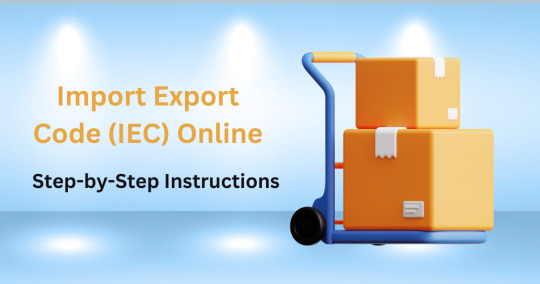
What is an Import Export Code (IEC)?
An Import Export Code (IEC) is a 10-digit unique identification number issued by the Directorate General of Foreign Trade (DGFT), a part of the Indian government. It is mandatory for any individual or business entity wishing to engage in import and export activities in India. This code serves as a primary document for customs authorities to track and monitor international trade transactions.
How to apply for an IEC code online?
To apply for an IEC code online in India, you need to visit the DGFT's official website and fill out the required application form. You will need to provide essential documents and information, such as PAN (Permanent Account Number), bank details, and a valid address proof. After submission, you will receive a unique IEC code, typically within 1-2 business days.
Eligibility criteria for obtaining an IEC code in India:
The eligibility criteria for obtaining an IEC code in India are quite liberal. Individuals, partnerships, companies, and LLPs (Limited Liability Partnerships) can all apply for an IEC code. There is no need to demonstrate specific turnover or export-import experience to be eligible.
Process for IEC code registration:
The process for Import Export Code registration involves the following steps:
a. Visit the DGFT website.
b. Complete the online application form.
c. Upload the necessary documents.
d. Pay the prescribed fees.
e. Wait for processing and approval.
f. Receive the IEC code via email.
Are there any fees associated with IEC code registration?
Yes, there are fees associated with Import Export Code registration, which may vary depending on the entity type. These fees can be found on the DGFT website and are subject to change over time.
Penalties for not having or not renewing an IEC code:
Yes, there can be penalties for not having or renewing an IEC code. Importing or exporting goods without a valid IEC code can result in legal consequences and fines. It's crucial to ensure that your IEC code remains valid and up to date.
Benefits of having an IEC code for exporters and importers:
The benefits of having an IEC code for exporters and importers include:
Facilitating international trade transactions.
Enabling access to various government incentives and benefits.
Streamlining customs clearance processes.
Establishing credibility in the international market.
Some tips for maintaining and managing your IEC code effectively:
To manage your IEC code effectively, consider the following tips:
Keep it up to date by renewing it as required.
Maintain accurate records of your import-export transactions.
Notify the DGFT of any changes in your business details promptly.
Be aware of and comply with any changes in import-export regulations.
Conclusion:
An Import Export Code (IEC) is a crucial requirement for anyone involved in import and export activities in India. Obtaining and maintaining an IEC code is relatively straightforward, and it offers numerous benefits to exporters and importers, such as simplifying customs procedures and gaining access to government incentives. It's essential to stay compliant with IEC regulations to avoid penalties and ensure a smooth international trade experience.
0 notes
Text
Quick & Easy IEC Code Registration with Corpseed
Need an IEC Code Registration to start your import-export business? Corpseed offers fast, reliable, and hassle-free services to get your Import Export Code (IEC) issued by DGFT. Our experts handle the entire process, from documentation to final approval.
0 notes
Text
🌍 IEC Registration in India : Step-by-Step Guide for Importers & Exporters
1. Introduction The Import–Export Code (IEC) is a mandatory 10-digit identifier issued by the Directorate General of Foreign Trade (DGFT) for individuals and businesses conducting any cross-border trade of goods or services. IEC is essential for customs clearance, availing export incentives, filing shipping bills, and opening EEFC/FEMA-compliant accounts. 2. Eligibility Criteria for IEC…
0 notes
Text
Import Export Code (IEC) Registration: Eligibility & Requirements
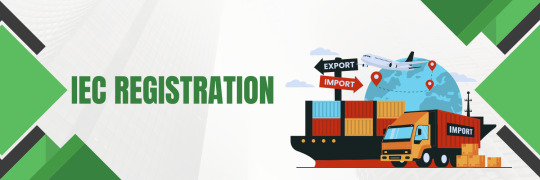
Businesses now need to adhere to international trade regulations because of India's growing worldwide trade. Getting the IEC Code is the first step for every business, whether it is an established company venturing into the import-export industry or an entrepreneur seeking to investigate new international markets. The Directorate General of Foreign Trade (DGFT) issues the Import Export Code, which serves as a special identifying number for companies conducting cross-border trading. A legal and essential prerequisite for any Indian company that imports or exports goods or services is IEC Code Registration. The IEC Registration procedure, eligibility requirements, necessary paperwork, and how frequent IEC updates guarantee smooth international trade compliance are all covered in this extensive handbook.
What is an IEC Code?
The Import Export Code (IEC) is a 10-digit alphanumeric code issued by the DGFT under the Ministry of Commerce and Industry, Government of India. It is mandatory for every individual or business engaged in the import or export of goods and services from India.
Without valid Import Export Code Registration, businesses cannot:
Clear shipments through customs
Receive foreign currency payments
Avail export subsidies or benefits under foreign trade policies
Hence, IEC Code Registration not only confirms compliance but also increases a business’s credibility in global markets.
Why is IEC Code Important?
IEC acts as the passport for international trade. Here's why it is essential:
Customs Clearance: IEC is mandatory for clearing shipments at Indian ports and airports.
Banking Compliance: Banks require IEC to authorize foreign remittances for import/export transactions.
Trade Benefits: Entities with IEC can avail benefits under various government schemes like RoDTEP, MEIS, and SEIS.
Global Expansion: It facilitates expansion to international markets and builds trust with foreign buyers or sellers.
Without IEC Registration, even the most promising international deals can hit a regulatory roadblock.
Who Needs IEC Code Registration?
IEC Registration is required by:
Businesses involved in the import of goods or services
Exporters of physical goods or digital services
Proprietors, partnerships, LLPs, companies, trusts, or HUFs engaged in cross-border trade
E-commerce sellers shipping internationally
Note: Even if you are a freelancer providing services abroad and receiving foreign currency payments, you must obtain an IEC.
Who Is Exempted from IEC Registration?
While most businesses involved in import/export activities must have an IEC, the following are exempted:
Departments and ministries of the Central or State Government
Individuals importing or exporting goods for personal use unrelated to trade or manufacturing
Import/export activities covered under special categories like the diplomatic corps or defense-related imports
For all others, especially businesses, Import Export Code Registration is non-negotiable.
IEC Code Registration Eligibility Criteria
There are no complex eligibility conditions, making IEC Registration simple and accessible. However, applicants must make certain:
Valid PAN: The applicant (individual or entity) must have a valid Permanent Account Number (PAN).
Business Registration: If applying as an organization, it must be legally registered under applicable Indian laws.
Bank Account: A current bank account in the entity’s name (matching PAN) is required.
Operational Premises: The business must have a valid address with supporting proof.
Digital Signature (DSC): For companies and LLPs, DSC is mandatory for online filing.
There is no minimum turnover requirement, and even startups or freelancers can apply for an Import Export Code.
How to Apply for Import Export Code Registration: Step-by-Step Process
The Import Export Code Registration process is completely online and user-friendly. Follow these steps:
Step 1: Visit the DGFT Portal
Go to the website .
Create a new user account if not already registered
Step 2: Choose IEC Application
Login to your account
Go to the ‘Services’ section and select ‘Apply for IEC’
Step 3: Fill in Business Details
Provide accurate details about your business, including:
Name of applicant/entity
PAN and address
Bank details
Type of business (proprietor, firm, company, etc.)
Step 4: Upload Required Documents
Confirm that all supporting documents (PAN, address proof, canceled cheque, etc.) are scanned and ready for upload in the prescribed format.
Step 5: Payment of IEC Registration Fee
Pay the application fee (INR 500 as of the latest notification) online via net banking or UPI.
Generate payment acknowledgment.
Step 6: Submit the Application
Once everything is verified, submit the application.
Upon approval, you will receive the IEC Code digitally, usually within 1-2 working days.
Recognizing IEC Update Requirements
Once you receive your IEC, it is valid for a lifetime and does not require renewal. However, as per recent changes introduced by DGFT:
Annual IEC Update Is Mandatory
From 2021 onward, all IEC holders must update their IEC information annually—even if no changes have occurred.
Key Points:
The IEC update must be done between April and June each year.
Failure to update will result in deactivation of the IEC.
Reactivation can be done later by submitting the update form.
This mandatory IEC update confirms that DGFT has up-to-date and accurate information for all entities involved in import/export.
Common Mistakes to Avoid During IEC Code Registration
Here are some frequent errors to watch out for:
Entering incorrect PAN or business details
Uploading documents in the wrong format or file size
Using a bank account not in the name of the entity
Missing the IEC update deadline after issuance
These mistakes can delay the approval or lead to rejection. Confirm complete and accurate information before submitting.
IEC Code for Service Exporters
Many people believe that IEC Code Registration is only for physical goods. However, that is not true. Service providers, freelancers, software developers, digital marketers, and consultants who receive foreign currency payments for services are also required to have an IEC Code. This enables them to receive foreign remittances legally and participate in global freelancing and service marketplaces.
Assumption
In India, the IEC Code is an essential component of every import-export enterprise. Timely IEC Code Registration guarantees compliance, eligibility for government advantages, and continuous cross-border trade, regardless of the size of your business. The procedure is simple, requires little paperwork, and may be finished online. Don't forget to update your IEC every year; doing so confirms smooth operations and keeps your company in compliance with changing requirements. Getting and keeping a valid Import Export Code opens the door to international business expansion in addition to fulfilling legal obligations.
FAQs on IEC Registration
Q1. Is GST mandatory for IEC Code Registration? Ans No. While GST can be added to the IEC profile, it is not mandatory for the IEC application.
Q2. Can one IEC be used for multiple branches or locations? Ans Yes. One IEC can be used across all branches of the same entity. However, address details must be added in the profile.
Q3. What is the validity of the IEC Code? Ans IEC is valid for life. Only an annual IEC update is required every year between April and June.
Q4. Is there any penalty for not updating IEC? Ans Non-updated IECs are deactivated and cannot be used until reactivated. No monetary penalty is levied but it may delay trade.
0 notes
Text
0 notes
Text
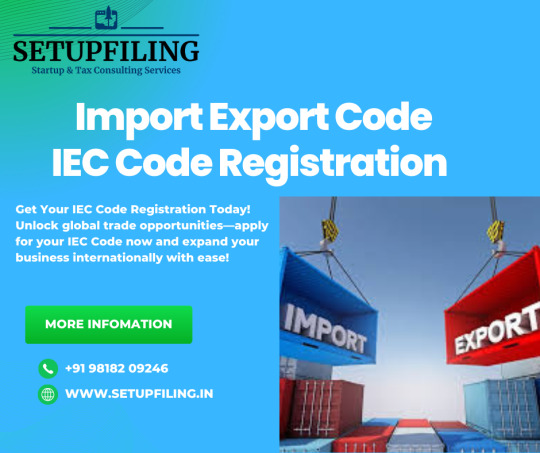
Import Export Code (IEC) Registration: A Comprehensive Guide
In today's global economy, the ability to engage in international trade is essential for businesses looking to expand their reach and tap into new markets. One of the key requirements for businesses that wish to import or export goods is obtaining an Import Export Code (IEC) registration. In this article, we will provide a detailed guide on what IEC registration is, why it is important, and how you can go about obtaining it.
What is Import Export Code (IEC) Registration?
Import Export Code (IEC) registration is a 10-digit unique code issued by the Directorate General of Foreign Trade (DGFT), Ministry of Commerce and Industry, Government of India. This code is mandatory for businesses or individuals engaged in the import or export of goods and services to or from India. The IEC registration is a prerequisite for clearing customs and obtaining other necessary documents for international trade.
Why is IEC Registration Important?
Having an IEC registration opens up a world of opportunities for businesses. It allows them to engage in international trade, expand their market reach, and take advantage of various benefits and incentives offered by the government. Additionally, having an IEC registration is essential for businesses looking to establish credibility and trustworthiness in the eyes of foreign partners and customers.
How to Obtain IEC Registration?
Obtaining an IEC registration is a relatively straightforward process. Here are the steps you need to follow:
Visit the DGFT Website: Go to the DGFT website and click on the "IEC" tab.
Fill Out the Application Form: Fill out the online application form with all the necessary details about your business, such as name, address, type of business, etc.
Submit Required Documents: Upload the necessary documents, such as proof of identity, address proof, and bank details.
Pay the Registration Fee: Pay the registration fee online through the portal.
Receive IEC Certificate: Once your application is processed and approved, you will receive your IEC certificate via email.
Frequently Asked Questions
1. How long does it take to get an IEC registration?
The processing time for IEC registration is typically around 1-2 working days from the date of submission of the application.
2. Do I need to renew my IEC registration?
No, IEC registration does not need to be renewed. Once you have obtained your IEC certificate, it is valid for a lifetime. In conclusion, obtaining an Import Export Code (IEC) registration is a crucial step for businesses looking to engage in international trade. It opens up a world of opportunities and benefits for businesses, making it an essential requirement for anyone looking to expand their reach globally. So, if you're serious about taking your business to the next level, make sure to get your IEC registration today.
Looking to expand your business globally? Learn all about Import Export Code (IEC) registration and how it can benefit your business. Get your IEC certificate today! By following the steps outlined in this guide, you can easily obtain your IEC registration and start reaping the benefits of international trade.Read More>>>
0 notes
Text
Benefits Of Import Export Registration
The Importer Exporter Code (IEC) is an indispensable tool for businesses aiming to engage in international trade.

Here’s an in-depth look at the benefits of having an IEC:
1. Expansion of Business
Global Market Access: With an IEC, businesses can expand their operations to international markets, significantly increasing their potential customer base and revenue opportunities.
New Opportunities: International markets offer various opportunities for business growth. Companies can explore new product lines, cater to diverse customer needs, and establish partnerships with global players.
2. No Return Filing
Simplified Compliance: IEC does not require the holder to file periodic returns. This makes compliance straightforward and less time-consuming, allowing businesses to focus on their core activities.
One-Time Registration: The IEC is issued for the lifetime of the entity, eliminating the need for renewal.
3. Government Benefits
Export Promotion Schemes: The Indian government offers various export promotion schemes such as MEIS (Merchandise Exports from India Scheme) and SEIS (Service Exports from India Scheme).
Customs Clearance: An IEC is mandatory for the customs clearance of goods. It ensures smooth and hassle-free processing of import and export consignments, reducing delays and operational costs.
4. Banking Facilitation
Foreign Transactions: Banks require an IEC to process foreign exchange transactions related to international trade. This includes payments for imports and receipts for exports.
5. Recognition and Credibility
Official Recognition: Possession of an IEC provides official recognition to your business as a legitimate importer/exporter. This recognition can enhance your reputation and build trust with international customers and suppliers.
Brand Image: An Import-Export registration can improve your business's brand image in the global marketplace.
6. Reduction in Illegal Activities
Regulatory Compliance: The IEC ensures that businesses adhere to international trade regulations, thereby reducing the risk of engaging in illegal or fraudulent trade activities.
Transparency: Having an IEC brings transparency to cross-border transactions, helping regulatory bodies track and regulate trade activities effectively. This transparency also builds trust with trade partners.
#import export registration#DGFT License#Import Export License#iec license#IEC Code#Import Export Code#DGFT Code
0 notes
